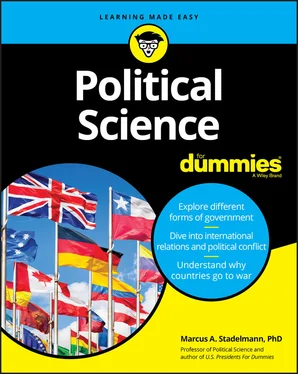1 ...6 7 8 10 11 12 ...20
Employing empirical theory
Empirical theory explains human behavior and events and tests them to see whether they’re true. The political scientist stops assuming when trying to explain, and testing of theories becomes the norm for the discipline.
Traditionalism uses normative theory (see earlier section on traditionalism) when engaging in research. It was acceptable for traditionalists to bring their own personal preferences and values into their research. There was no need to test theories. Behavioralists reject this type of research. For them, bringing personal values into research makes findings not just unscientific but also unacceptable and biased. Political science for them needs to be a real science, using theories that have been tested and are value-neutral. For this reason, instead of creating explanations of behavior and events based on personal preferences, behavioralists want to test their theories. This is possible only if you employ empirical theory.
Mathematics is one of the most objective disciplines in academia. It’s a natural or hard science, and people believe that it’s impossible to bring values (personal influences) into mathematical research. It makes no difference whether a person is a liberal, conservative, or even communist; when political scientists undertake research using mathematics, they all come to the same conclusions. Adding, subtracting, and using advanced mathematical formulas are all objective and value-free activities.
Not surprisingly, using mathematics to test theories appeals to behavioralists, who believe in objectively testing theories. The best way to tell the academic world that you’re being truly scientific and objective is to test a theory using mathematics, especially statistics. How can people bring their personal norms and values into statistics? Beginning with behavioralism, the use of mathematics in political science is encouraged, and today quantitative analysis has become the norm.
 Quantitative analysis is research using numbers derived from survey research, such as public opinion polls or other data sets previously created by other social scientists. Its opposite is qualitative research, which is research using nonnumerical data. In other words, the political scientist deals with some research to which mathematics can’t be applied. Examples are field studies by anthropologists or detailed case studies.
Quantitative analysis is research using numbers derived from survey research, such as public opinion polls or other data sets previously created by other social scientists. Its opposite is qualitative research, which is research using nonnumerical data. In other words, the political scientist deals with some research to which mathematics can’t be applied. Examples are field studies by anthropologists or detailed case studies.
Like natural scientists, behavioralists believe that researchers can be truly objective when they’re conducting their research. Personal beliefs and preferences don’t matter and can be set aside during research. For example, a behavioralist believes that both an American researcher and a Russian researcher can look upon a certain event the same way and draw the same conclusions from the event, regardless of time and location.
For example, when studying the outbreak of war, the American political scientist could have researched an event 200 years ago and the Russian researcher could have studied it today. Both would come to the same conclusion. It is therefore possible to perceive events the same way, regardless of time, location, cultural upbringing, and personal preferences. This school of thought is called positivism or the French school of thought.
 Positivism or the French school of thought was developed in the 19th century by French philosopher Auguste Comte. Positivism applies natural science techniques to study societies. It further stresses science and knowledge and advocates testing of all theories. Positivism believes that true objectivity exists and that all scientific experiences are based on sensory experiences — that is, social scientists can collect data using scientific observation, without bringing their own values into the research. This means that what you observe in the 18th century you’ll observe in the 21st century and then draw similar conclusions. Perception makes you aware, and researchers perceive it the same way regardless of time and place. True objectivity and grand theory is thus possible.
Positivism or the French school of thought was developed in the 19th century by French philosopher Auguste Comte. Positivism applies natural science techniques to study societies. It further stresses science and knowledge and advocates testing of all theories. Positivism believes that true objectivity exists and that all scientific experiences are based on sensory experiences — that is, social scientists can collect data using scientific observation, without bringing their own values into the research. This means that what you observe in the 18th century you’ll observe in the 21st century and then draw similar conclusions. Perception makes you aware, and researchers perceive it the same way regardless of time and place. True objectivity and grand theory is thus possible.
Unlike traditionalism, behavioralism is based on the classical liberal school. It begins to question government decisions but at the same time also works with governments to find solutions to present-day problems.
For example, the Kennedy administration worked closely with political scientists to tackle issues such as spreading democracy or maintaining political stability in the newly created nation-states in Africa and Asia. While traditionalism supports government policies, thereby creating legitimacy for many governments, behavioralism isn’t afraid to critique governments and regimes and often gets involved with government in the policy-making process.
Unlike traditionalism, behavioralism studies the whole world. The Eurocentric view of the past disappears and more studies focus on the newly created Third World. After World War II ended, the large colonial empires of the British and French collapsed, and suddenly new countries were created mostly in Africa and Asia. This allowed for the political scientist to move away from purely studying Europe. Decolonization has created more and more exciting options to study, and behavioralism takes advantage of this.
Turning the social sciences into a real science
For centuries, the social sciences, of which political science is a part of, felt inferior to the natural sciences because they weren’t considered real or hard sciences, in the same boat as physics or chemistry, because they didn’t have any grand theories. Grand theories, which are universal in nature, are the backbone of the natural sciences. Unless you have grand theories, you’re not a real science. Physical laws, for example, transcend time and hold true everywhere. Now that is a real science.
Political science especially didn’t have any of these grand theories. So during the behavioralist period, it set out to get a few. Systems theory, an example being the Theory of Hegemonic Stability, which I discuss in Chapter 8, and culture theories, such as the Civic Culture Theory, which I cover in Chapter 3, come close to grand theory in political science. Using grand theories and being truly objective in research can qualify the discipline as a natural or real science.
Moving Leftward with Post-Behavioralism
Unlike both traditionalism and behavioralism, the school of post-behavioralism has a specific birth date. It was created by David Easton, one of the great political scientists of our time (see Chapter 19). He coined the term in his address to the American Political Science Association in 1969.
He argued that the school of behavioralism was necessary in the 1950s and had done a lot of good for the discipline. However, by trying to become a natural science, political science had forgotten what it was all about. Political scientists are supposed to deal with current problems the world is facing and help people in the process. Instead, according to Easton, behavioralists ignored the current world and its problems, instead focusing only on trying to make political science become a real science. In the process, they created grand theories that were so abstract and complex that they couldn’t be applied to the real world. Easton urged a compromise. He argued that political science should keep a part of behavioralism but ignore other parts of it. Thus the term post-behavioralism. I explain the parts of behavioralism that were kept and what were discarded in the following sections.
Читать дальше

 Quantitative analysis is research using numbers derived from survey research, such as public opinion polls or other data sets previously created by other social scientists. Its opposite is qualitative research, which is research using nonnumerical data. In other words, the political scientist deals with some research to which mathematics can’t be applied. Examples are field studies by anthropologists or detailed case studies.
Quantitative analysis is research using numbers derived from survey research, such as public opinion polls or other data sets previously created by other social scientists. Its opposite is qualitative research, which is research using nonnumerical data. In other words, the political scientist deals with some research to which mathematics can’t be applied. Examples are field studies by anthropologists or detailed case studies. Positivism or the French school of thought was developed in the 19th century by French philosopher Auguste Comte. Positivism applies natural science techniques to study societies. It further stresses science and knowledge and advocates testing of all theories. Positivism believes that true objectivity exists and that all scientific experiences are based on sensory experiences — that is, social scientists can collect data using scientific observation, without bringing their own values into the research. This means that what you observe in the 18th century you’ll observe in the 21st century and then draw similar conclusions. Perception makes you aware, and researchers perceive it the same way regardless of time and place. True objectivity and grand theory is thus possible.
Positivism or the French school of thought was developed in the 19th century by French philosopher Auguste Comte. Positivism applies natural science techniques to study societies. It further stresses science and knowledge and advocates testing of all theories. Positivism believes that true objectivity exists and that all scientific experiences are based on sensory experiences — that is, social scientists can collect data using scientific observation, without bringing their own values into the research. This means that what you observe in the 18th century you’ll observe in the 21st century and then draw similar conclusions. Perception makes you aware, and researchers perceive it the same way regardless of time and place. True objectivity and grand theory is thus possible.










